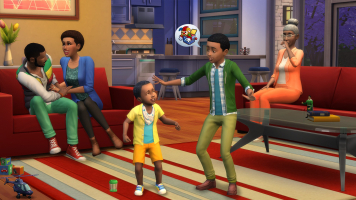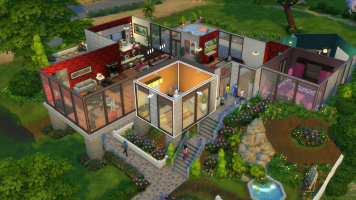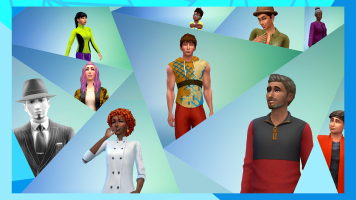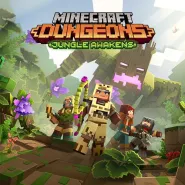




Since its release in September 2014, The Sims 4 has entrenched itself as a cornerstone of life simulation games, offering an unparalleled canvas for creativity and storytelling. It is the latest iteration of a series that has captivated players for decades with its quirky blend of real-life simulation and fantastical elements. The game is a mirror, reflecting the multifaceted nature of human lives through its digital personas—Sims that inhabit the vibrant communities crafted by the players themselves.
The Sims series has always been renowned for giving players control over the lives of these digital beings, and The Sims 4 takes this to new levels with its rich character development, robust building tools, and endless gameplay scenarios. The digital landscape in The Sims 4 is a living, breathing world where every decision shapes the lives of the Sims within it.
Gameplay Depth and Immersive Content
The core mechanics of The Sims 4 are centered on the crafting and oversight of digital individuals, referred to as Sims. Players guide Sims through their daily routines, encompassing everything from basic needs like eating and sleeping to complex emotions and career aspirations. The game's intuitive Create-a-Sim tool allows for deep customization of a Sim's appearance and personality, ensuring that each character is unique.
Players can build their Sims' homes from scratch or choose from pre-made designs, tweaking them to their heart's content using a sophisticated building system. The furnishing and decor choices bring out an interior designer in every player, with a vast array of styles and items to choose from.
Aural and Visual Artistry
The Sims 4's soundtrack and voice acting are particular highlights, composed to complement the game's various activities and settings. The music ranges from soothing instrumental tracks during home-building sessions to vibrant tunes that accompany your Sims' outings to neighborhood events. Simlish, the fictional language spoken by the Sims, adds a layer of charm and personality to the experience, with voice actors delivering lines in a way that reflects each Sim's mood and personality.
Artistically, The Sims 4 features a unique, stylized look that is both colorful and expressive. This approach allows the game to feature diverse architectural styles and fashion trends while maintaining a cohesive visual identity. The game has successfully captured an aesthetic that is eye-catching and endearing without being overly realistic, striking a balance that has appealed to a wide audience.
Influence
The legacy of The Sims 4 is still unfolding, but it's clear that the game has had a profound impact on the genre of life simulation. Its open-ended gameplay serves as a digital playground, inspiring countless stories and scenarios generated by its passionate community. The game's success has encouraged an era of player content creation, with a bustling ecosystem of mods and custom content that has greatly extended the game's lifespan.
Recognizing the Shortcomings
Some users have criticized the game for lacking content at launch or for the expensive array of expansion packs necessary to fully realize the game's potential. These add-ons, while adding rich new features and layers of complexity, can be seen as a barrier for players looking for a complete experience without additional investment. Furthermore, some long-time fans feel that certain elements and depth present in previous titles have been diluted or removed, leading to a less robust simulation.
Players' Sentiments and Future Directions
The diehard fans of The Sims 4 often talk about their deep emotional attachment to the characters they create and the worlds in which they dwell. This sense of ownership and personal investment is rare in gaming, showcasing just how immersive and captivating the experience can be. The game has a strong replay value thanks to its unpredictability and the diverse stories that players can create. User impressions typically revolve around the joy of storytelling, the thrill of watching Sims achieve their dreams or succumbing to their misadventures, and the satisfaction of architectural design.
Numerous players have voiced their praise for the inclusive nature of the game's design, which offers boundless personalization features affording the portrayal of diverse identities and lifestyles. Additionally, the communal aspect, which extends beyond the game into digital spaces, stands out for many. Online discussion boards, social networking circles, and the exchange of user-generated content contribute to a collaborative environment that champions collective imagination and camaraderie.
The influence of The Sims 4 is likely to carry forward into future gaming experiences, with its strong focus on character autonomy, emotional depth, and community engagement setting a high bar for life simulation games. Players' enduring enthusiasm and the rich tapestry of tales they weave will continue to shape the franchise's legacy for years to come.
Pros
- Extensive character customization with Create-a-Sim;
- Intricate and user-friendly building tools;
- Expressive and stylistic visual art designs;
- Engaging and varied soundtrack paired with unique Simlish voice acting;
- A supportive and creative player community;
- Regular game updates and a rich array of expansion packs;
Cons
- The base game can feel incomplete without additional expansion packs;
- High cost of obtaining all game content through DLCs;
- Removed features from previous games disappoint some fans;
- Learning curve for new players unfamiliar with simulation games;




























